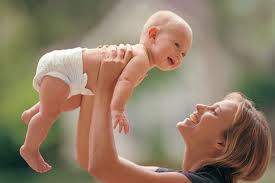 Respecting mothers and babies throughout pregnancy and birth (and life for that matter!) is one of the main points of focus of the Birthing Without Fear methodology. The sacred bond between mother and child and the parental bonding with our children as nature intended, is the heart and soul of what I am passionate about.
Respecting mothers and babies throughout pregnancy and birth (and life for that matter!) is one of the main points of focus of the Birthing Without Fear methodology. The sacred bond between mother and child and the parental bonding with our children as nature intended, is the heart and soul of what I am passionate about.
The following article is written by Darcia Narvaez, Ph.D. and published on www.Psychologytoday.com.
Ten Ways to Truly Respect Motherhood
When my mother was having her children in the 1950s and 1960s, mothers were “knocked out” and babies were extracted with forceps and taken away. Such disrespect of mothers, babies, and motherhood! You can see the resulting damaged bonding of mothers to children in this time period in shows like Mad Men or movies like The Hours. Many disrespectful practices still exist today— to the detriment of moms, babies and society.
Here is a preliminary list of ways to respect mothers, babies and motherhood
Before and during pregnancy, and after child is born
1. Provide extensive social support of the mother as a person.Of course this starts with the mother’s early life—being well supported, cared for and nourished—so that when she becomes a mother she can be self-assured, confident and in touch with her body signals. This is normal in indigenous cultures.
2. Provide social support for the mother-child dyad. Mothers do not commit to babies by themselves. To be totally committed they need to know that the community is with them.
3. Help moms-to-be and mothers stay relaxed. Fetuses receive the communications from their mother’s body—when mom is stressed the baby’s body becomes stressed, leading to irritability and other problems after birth. Mothers have difficulty being warmly responsive to their children’s needs when they are food insecure or lack social support.
4. Encourage loving attention to children. Children expect to be loved and nurtured. Babies become upset when their evolved expectations are not met. And babies are needy. Well-cared-for mothers are eager to meet their needs.
5. Good nutrition. What the mother and father eat before conception matters for the child’s health. What mother eats during pregnancy and breastfeeding influences the health and food preferences of the child.
At childbirth
6. Social support (doula to coach mom; midwife with wisdom of women’s body signals). As humans evolved, assistance with childbirth also became more common. Current research shows that a mom-centered birthing coach (doula) is linked to better outcomes for mom and baby.
7. Offer alternatives to drugs (e.g., epidurals) which interfere with maternal-child bonding. breastfeeding, and wellbeing of the dyad—with longterm consequences for society. Doulas are an alternative that probably end up being least costly in multiple ways. In contrast, drugs in a mother transfer to the fetus who has no liver function to expel them for many weeks. Drugged babies have difficulty latching on to the breast for feeding. This is the slippery slope to using formula, a choice that should be used only in emergencies. (Studies on drug addicts should examine whether they are more likely to have started life as a drugged baby.)
8. Keep baby and mother together with gentle practices as they “imprint” on one another and start their relationship. This means immediate skin-to-skin contact; no painful procedures on the baby in the first days of life; no separation of mom and baby; no use of pacifiers, sugar water, formula.
Imagine in the heat of making love, separating and having your teeth drilled. This is what it is like for the baby at birth with the various painful procedures used (e.g., suction, heel pricks, eye ointment, harsh cloth). The magic of connection is lost. And how would you like pain to be your first impression of the world?
After childbirth
9. Integrate baby and mother into regular social and work life.Mothers are not meant to be isolated with children. The massive depression that plagues US mothers after birth is unusual in the history of the world — if it were “normal” our species would have died out long ago. Hospital practices contribute to incidents of depression when they separate mom and baby (mom’s body assumes the child is dead).
10. Alloparents sensitively co-care for child. Babies are meant to be cared for by an extended family of caring adults that passes the child around and provides the 24/7 companionship care that babies expect.
Do these practice sound hard?If so, it’s only because we have let our societies move so far away from them. These practices are part of our evolutionary heritage and lead to mom and baby wellbeing.
How do we get there from here?
Hospitals need to change their childbirth practices with thoughts towards long term consequences for mother-child bonding, child development and health.
Hospitals need to become breastfeeding friendly and friendly to optimal health outcomes.
Society needs to provide sufficient support to women, mothers, fathers and families so that stress of having and raising children is minimized.
Parents, along with family members, need to be educated aboutwhat babies need, what the options are for birthing and for childrearing.
Workplaces need to allow parents to bring babies to work. When babies are well-cared for according to evolved expectations, they are not noisy and annoying.
I salute my mother today. She struggled to be a mother when the world around was hostile to her and to her children. My pledge to her now is to make the world less hostile for mothers and for babies.
